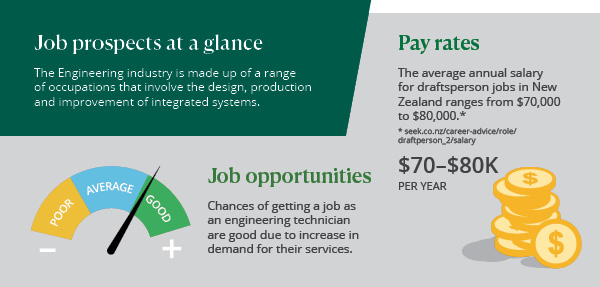You will gain a solid grounding in engineering theory and the principles of engineering science including design and drawing, materials, surveying hydraulics, geotech structures and highways.
Engineers are in demand and successful graduates will be able to seek work as Engineering Technicians.
This programme is internationally benchmarked and recognised under the well-respected Dublin Accord, which opens up opportunities to working both in New Zealand and internationally.
You will learn how to:
- competently perform technical operations to the standards, ethical and professional responsibilities required by the engineering profession. As per the Dublin Accord 2002.
- work collaboratively within team environments to provide a comprehensive engineering service in the relevant specialist area.
- apply the principles of the Treaty of Waitangi, the Resource Management Act and Health & Safety in Employment Act while carrying out engineering activities.
Civil Engineering strand graduates will also be able to:
- apply engineering theory to practice working within well-defined* engineering problems relevant to their specialist field of civil engineering.
- use their engineering knowledge to make informed problem solving decisions in civil engineering and to implement these decisions.
- identify, evaluate and manage risks within well-defined* engineering problems relevant to their field of civil engineering.
*Well-defined engineering problems can be solved in standardised ways, are frequently encountered and hence familiar to most practitioners in the specialist area, have consequences that are locally important but not far-reaching and can be resolved using limited theoretical knowledge but normally require extensive practical knowledge.

 |
 |
 |

NZIHT Te Pukenga
This qualification is delivered in partnership with the NZIHT Te Pūkenga. You can find out more about their programmes and block courses on their website.
Entry Requirements
- NCEA Level 2 including 12 credits in mathematics; or
- Equivalent knowledge, skills, work experience or study.
Any applicants whose first language is not English will be required to provide evidence of an overall IELTS (Academic) band score of 6.0 (academic) with no less than 5.5 in any band, or equivalent.
Text books
You can find a list of textbooks needed for this programme here
Career Options
The NZDE (Civil) prepares a student for a career in the civil engineering industry at technician level. Civil engineers plan, design and construct the infrastructure in which we live and work. This includes the establishment of facilities like roads, railways, airports, water supply, drainage, wastewater disposal, bridges, dams, multi-storey buildings, tunnels and other public works.
Civil engineers are employed by a range of different organizations including district and city councils, engineering consultants, contractors, transportation agencies such as NZ Transport Agency, academic institutions, environmental agencies etc.
Civil engineering technicians handle the technical details for building and maintaining infrastructure projects - such as roads, bridges, tunnels, buildings, and waste water systems. They may work with a civil engineering consultancy, a civil construction contractor or a council. The Civil Engineering Technician may work in a number of roles such as Contract Manager, Laboratory Technician, Design Draughtsperson, Site Investigator, Surveying, Asset Management and Engineering Administration.
Changes for new learners
WITT and this programme are part of Te Pūkenga – New Zealand Institute of Skills and Technology .

